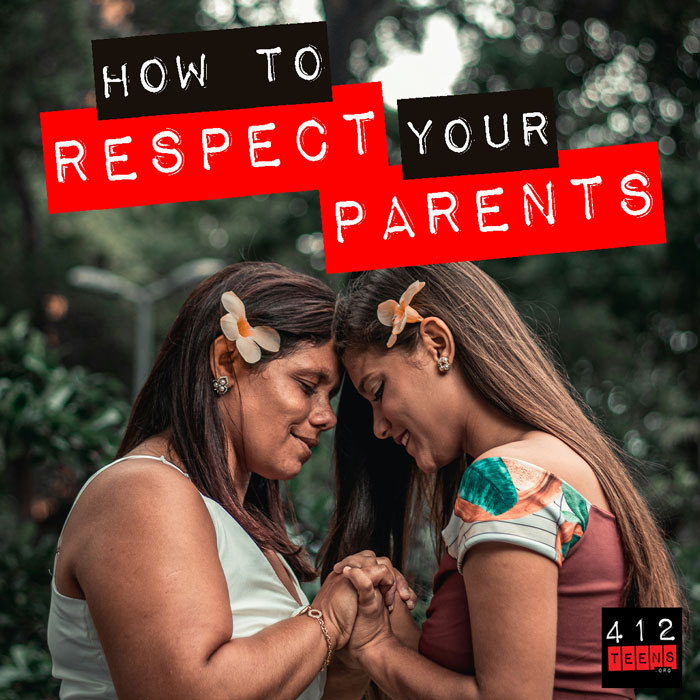What does the Bible say about respecting your parents?

The Bible doesn't actually specifically mention respecting our parents. So does that mean we're off the hook? Nope. The idea of respect is implied in other biblical principles that God has given us about honoring our parents.
Honor Your Parents
"Honoring" someone means giving value to that person and treating them with the dignity they deserve as part of God’s creation and plan. Regardless of our parents’ behavior and character, we are supposed to give them honor (Exodus 20:12). The idea of honor is directly connected to respect, and the formula for honor shows us how to treat our parents. Because of their priceless roles as mother and father, we should give them attention and esteem. (In the case of abusive parents, we do need to approach that a bit differently.)
Obey Your Parents
As children, obedience is the way we respect our parents (Ephesians 6:1; Colossians 3:20). It doesn't matter if we LIKE what they tell us or not—unless they're asking us to do something sinful, kids should listen and obey. Parents should expect obedience to help children, as they should be teaching their children to grow into respectful adults. Parents ought to teach through example by respecting what their kids have to say too. The only instance where disobedience is acceptable is if a parent asks the child to do something that causes them to sin (Acts 5:29).
What if my parents don't understand me?
Of course, as we grow up, respecting our parents can get harder. They may not see that we're becoming our own person, that we want and need independence. If they aren't Christians, they may not understand our faith or discourage us from sharing with others. Yet, respect is still absolutely necessary. Most of the time, they're doing the best they're able to raise us to become functional humans.
If you feel like your parents are not letting you spread your wings enough or dismissing your faith, a respectful conversation is much better than fighting or rebellion. Respectful behavior is commanded by God, and rebelling against them for no good reason is a sin. Plus, a respectful conversation shows you've been learning and taking their guidance to heart.
Adults living on their own no longer need to OBEY their parents, but they still need to HONOR them and consider their counsel in a respectful way (Proverbs 23:22). Keeping in touch with your parents after you move out is another way to honor and respect them. As long as the relationship is healthy, let them stay in your life, especially as they age. Older parents have increasing needs, and adult children should be aware and be prepared to help meet those needs if possible. Refusing respect leads to bitterness (Hebrews 12:15), which isn't healthy for anyone.
Painful, Toxic, or Abusive Parents
We acknowledge that not all parents act in godly ways. There may be abusive, neglectful, or toxic behavior in many households, and survivors need to maintain strict physical, spiritual, and emotional boundaries to stay safe and break toxic patterns. But those boundaries should be instigated with humility and respect, because even bad parents are made in the image of God (James 3:9).
The relationship between adult child and abusive parent will look quite different and potentially more distant than a healthy parent-child relationship, yet we can still be respectful. This may look like refraining from publicly shaming them or otherwise trying to "punish" them. If possible, we should take steps to restore the bond, but it may be wise to do so under the guidance of a trusted counselor. If restoration is not possible for whatever reason, it's OK to distance ourselves from those who are causing us harm. God has so much grace for us in those situations.
A healthy relationship between a child and their parent is an irreplaceable one to be treasured. Our parents deserve respect and honor—even if they've failed us in small or large ways—because they are creations of God and have been given a special part to play in our lives.
ALSO SEE:
- What does the Bible say about family?
- What does it mean to honor my parents?
- How can I honor or show respect to an abusive parent?
- Being Treated Like an Adult
- How do I honor my parents when we disagree on religion?
- When Parents Won't Let You Share Your Faith
- What if I'm losing the faith I grew up with?
- How do I stand up for myself in a godly way?
- How do I control my hormonal emotions?


TL;DR
Respecting our parents is not specifically mentioned in the Bible, but it is still an important biblical principle. God calls us to honor our parents all our lives (Exodus 20:12). Children show this honor by obeying their parents (Ephesians 6:1; Colossians 3:20). Adults children show respect through maintaining the relationship and listening to and considering their parents’ advice (Proverbs 23:22). Even bad parents deserve respect—which can be maintained through healthy boundaries—for the part they played in God’s plan for us.

Writer: Amanda Harman
Amanda is an awkward literature nerd who is more comfortable with words than people. Her family, understanding this shortcoming, has lovingly supplied her with many books over the years to give them reprieve from her attempts at conversation. She is now in college, where she gets to read entrancing textbooks on research and ethics, and where she attempts to share some knowledge in coherent sentences working as a peer tutor. One day, maybe, if she studies hard enough, God will help her have a natural interaction with a stranger.
